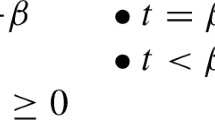Abstract
Deontic Logic goes back to Ernst Mally’s 1926 work, Grundgesetze des Sollens: Elemente der Logik des Willens [Mally. E.: 1926, Grundgesetze des Sollens: Elemente der Logik des Willens, Leuschner & Lubensky, Graz], where he presented axioms for the notion ‘p ought to be the case’. Some difficulties were found in Mally’s axioms, and the field has much developed. Logic of Knowledge goes back to Hintikka’s work Knowledge and Belief [Hintikka, J.: 1962, Knowledge and Belief: An Introduction to the Logic of the Two Notions, Cornell University Press] in which he proposed formal logics of knowledge and belief. This field has also developed quite a great deal and is now the subject of the TARK conferences. However, there has been relatively little work combining the two notions of knowledge (belief) with the notion of obligation. (See, however, [Lomuscio, A. and Sergot, M.: 2003, Studia Logica 75 63–92; Moore, R. C.: 1990, In J. F. Allen, J. Hendler and A. Tate (eds.), Readings in Planning, Morgan Kaufmann Publishers, San Mateo, CA]) In this paper we point out that an agent’s obligations are often dependent on what the agent knows, and indeed one cannot reasonably be expected to respond to a problem if one is not aware of its existence. For instance, a doctor cannot be expected to treat a patient unless she is aware of the fact that he is sick, and this creates a secondary obligation on the patient or someone else to inform the doctor of his situation. In other words, many obligations are situation dependent, and only apply in the presence of the relevant information. Thus a case for combining Deontic Logic with the Logic of Knowledge is clear. We introduce the notion of knowledge based obligation and offer an S5, history based Kripke semantics to express this notion, as this semantics enables us to represent how information is transmitted among agents and how knowledge changes over time as a result of communications. We consider both the case of an absolute obligation (although dependent on information) as well as the (defeasible) notion of an obligation which may be over-ridden by more relevant information. For instance a physician who is about to inject a patient with drug d may find out that the patient is allergic to d and that she should use d′ instead. Dealing with the second kind of case requires a resort to non-monotonic reasoning and the notion of justified belief which is stronger than plain belief, but weaker than absolute knowledge in that it can be over-ridden. This notion of justified belief also creates a derived notion of default obligation where an agent has, as far as the agent knows, an obligation to do some action a. A dramatic application of this notion is our analysis of the Kitty Genovese case where, in 1964, a young woman was stabbed to death while 38 neighbours watched from their windows but did nothing. The reason was not indifference, but none of the neighbours had even a default obligation to act, even though, as a group, they did have an obligation to take some action to protect Kitty.
Similar content being viewed by others
References
Belnap, N., M. Perloff and M. Xu: 2001, Facing the Future, Oxford.
D. Davidson (1980) Essays on Actions and Events Oxford University Press New York
R. Fagin J. Halpern Y. Moses M. Vardi (1995) Reasoning about Knowledge The MIT Press Boston
A. Grove (1988) ArticleTitleTwo Modellings for Theory of Change Journal of Philosophical Logic 17 157–179 Occurrence Handle10.1007/BF00247909
J. Halpern M. Vardi (1989) ArticleTitleThe Complexity of Reasoning about Knowledge and Time Journal of Computer and System Sciences 38 195–237 Occurrence Handle10.1016/0022-0000(89)90039-1
J. Halpern R. Meyden Particlevan der M. Vardi (2004) ArticleTitleComplete Axiomatizations for Reasoning about Knowledge and Time SIAM Journal of Computing 33 2 Occurrence Handle10.1137/S0097539797320906
Hilpinen, R.: 2001, Deontic Logic, In Lou Goble (ed.), Blackwell Guide to Philosophical Logic, Blackwell, pp. 159–182.
Hintikka, J.: 1962, Knowledge and Belief: An Introduction to the Logic of the Two Notions, Cornell University Press.
Horty, J.: 2001, Agency and Deontic Logic, Oxford University Press.
A. Lomuscio M. Sergot (2003) ArticleTitleDeontic Interpreted Systems Studia Logica 75 63–92 Occurrence Handle10.1023/A:1026176900459
E. Mally (1926) Grundgesetze des Sollens: Elemente der Logik des Willens Leuschner & Lubensky Graz
R. Meyden Particlevan der (1996) ArticleTitle‘The Dynamic Logic of Permission’ Journal of Logic and Computation 6 IssueID3 465–479
R.C. Moore (1990) ‘A Formal Theory of Knowledge and Action’ J.F. Allen J. Hendler A. Tate (Eds) Readings in Planning. Morgan Kaufmann Publishers San Mateo, CA 480–519
Pacuit, E.: 2005, Topics in Social Software: Information in Strategic Situations, Doctoral Dissertation, City University of New York Graduate Center.
Pacuit, E. and R. Parikh: 2004, ‘A Logic for Communication Graphs’, to appear in the post-proceedings of DALT 2004.
Parikh, R.: 1995, Knowledge Based Computation (Extended Abstract), In Proceedings of AMAST-95, Montreal, July 1995, Edited by Alagar and Nivat, Lecture Notes in Computer Science no. 936, pp. 127–42.
R. Parikh (2002) ArticleTitle‘Social Software’ Synthese 132 187–211 Occurrence Handle10.1023/A:1020391420768
Parikh, R.: 2003, ‘Levels of Knowledge, Games, and Group Action’, In Research in Economics 57, 267–281.
Parikh, R. and R. Ramanujam: 1985, ‘Distributed Processes and the Logic of Knowledge’, In Logic of Programs, LNCS #193, Springer pp. 256–268.
Parikh, R. and R. Ramanujam: 2003, ‘A Knowledge based Semantics of Messages’, In Journal of Logic, Language and Information 12, 453–467.
Wozna, B., A. Lomuscio, and W. Penczek: ‘Bounded Model Checking for Deontic Interpreted Systems’. Proceedings of the second Workshop on Logic and Communication in Multi-Agent Systems (LCMAS04). Nancy, July, 2004.
Author information
Authors and Affiliations
Corresponding author
Additional information
Earlier versions of this paper were presented at the conferences SEP-2004, and DALT-2004.
Rights and permissions
About this article
Cite this article
Pacuit, E., Parikh, R. & Cogan, E. The Logic of Knowledge Based Obligation. Synthese 149, 311–341 (2006). https://doi.org/10.1007/s11229-005-3877-6
Issue Date:
DOI: https://doi.org/10.1007/s11229-005-3877-6



